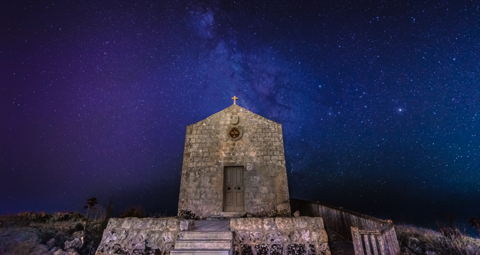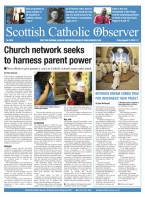August 4 | ![]() 0 COMMENTS
0 COMMENTS ![]() print
print

Mass tourism can have a downside
Attending church while on holiday, THE BOW IN THE HEAVENS discovers, is at times a frustrating experience. - Fr JOHN BOLLAN
WELL, it’s back to normality at St Joe’s. I thoroughly enjoyed my 10 days in the sun and it gave me a much-needed break.
Although I had taken my Mass kit with me, I decided to take advantage of Malta’s superabundance of parishes to join in worship with my fellow Catholics.
A part of me enjoys being on the other side of the altar while I’m away from my own parish. I find it both therapeutic and instructional to be ministered to, preached to, and, yes, even have the offertory basket passed to me (you can always spot a priest in the pews, as he tends to handle the basket like an unexploded bomb).
Or at least I enjoy going to Mass up to a point. If I’m being honest, in just about every holiday location where I have attended Mass there has been some idiosyncratic interpolation or puzzling omission from the liturgy. Sometimes I have been left wondering if I have come at the wrong time and inadvertently joined in the worship of another denomination that happens to share the building.
In one Church in Fuerteventura, the celebrant had a guitar around his neck for the duration of the Mass and it hung there distractingly like an albatross all the way through. Even more oddly, to my mind at least, he took himself off to his chair during the distribution of Holy Communion and delegated this task to extraordinary ministers, while Fr Eric Clapton showed us his guitar gently weeping. As did I, let me tell you.
On another occasion, this time in holy Malta, the priest had the words of one of the English Eucharistic prayers projected on to the wall and, like a conductor, he indicated which parts he wanted us, the orchestra, to strike up. I found myself in the unusual position of pointedly not joining in the words assigned to a concelebrant, while a fair number of the folk around me did do so, albeit in a desultory fashion.
I think it must be my thrawn Scottishness coming out in me, but I find that sort of thing intensely annoying. What annoys me most about it is that it prompts me to make somewhat harsh judgements about brother priests. I have no doubt that both of those priests (and they are not the only examples I could offer) were doing what they did with the best of intentions.
The former was using his God-given talents as a musician, and what better way to praise God than by using his gifts to enhance the liturgy? I daresay the latter was keen to promote a sense of active participation in the congregation, awakening them from their passive consumption of the liturgy and making them aware of their common priesthood.
But I would still say both priests were confused about their roles in the assembly.
It may have had something to do with the fact that both churches were also used in their spare time as auditoria, and the architecture may have added to the sense that the people of God were part of the audience. In different ways, they took it upon themselves to adapt, broaden or improve the Eucharistic liturgy to better connect with the people before them.
Therein lies the problem: they became the focus. They were most clearly visible acting as themselves, rather than the one they are meant to represent at the altar.
As far as I could tell, a good number of the folk around me were also somewhat wrong-footed by this. There is a saying of St Augustine that springs to mind: who is so foolish as to send a child to school to learn what the teacher thinks?
And so it might be said, why go to Church to see the Fr John Show? It’s that kind of clericalism which seldom goes unrecognised because the priests who practise it are unlikely to tick many of the boxes we associate with bossy or unctuous clerics. They’re all about the people, but it can look as though it’s all about them.
Of course, I may be accused of rank hypocrisy and my words might be drowned by the braying of an irony claxon in some people’s heads: after all, week after week, I dash off 1,300 words of pastoral commentary that, in reality, are all about me!
But my point stands: to the best of my knowledge, I celebrate the rites of the Church in the form that has been prescribed. Oh yes, there are words and other things that I would willingly change, for all sorts of reasons, but I don’t own the words in that sense. St Joseph’s is part of the corporation, the Body of Christ, and not a franchise outlet run by me.
Clearly my holiday has not helped my over-thinking. I mentioned last week that I was watching Jimmy McGovern’s drama Broken.
Well, having watched it all, I must concur with all those who recommended it to me. I found it deeply moving, affecting even: I’m not ashamed to say I was tearful at various points. I think part of the impact lay in the power of identification, and in this Mr McGovern has shown himself a skilful dramatist.
To capture the attention and sympathy of a lay audience, while also touching the heart of priests, is no mean feat.
I could identify with the bleakness of some of the lives on the screen: I know that some of my people routinely have to make decisions not along the lines of what is for the best, but rather, what’s the least worst.
Priesthood exercised in these circumstances is usually about powerlessness: the powerlessness of people who find themselves in such situations, often without clearly understanding how they got there, and the powerlessness of the priest to do much about it in concrete terms.
It is also about accepting the wisdom of the Confiteor in asking us to acknowledge both what we have done and what we have failed to do. And a priest’s sins of omission tend to weigh on him more than the others.
And that’s where the drama perhaps illustrates the situation I mentioned above, since a lot of it turns upon people’s perceptions of the priest and their reading of his own struggles as they are played out in his ministry and, it must be said, his demeanour.
There was sometimes a bit much of the Gospel being shoehorned into some ideological discourses for my taste, but I was deeply impressed by the series as a whole.
I’ve been in many of those situations and it’s made me a lot more conscious of the way the orientation of the liturgy, versus populum (towards the people) makes me more responsible for the face I show to them.
Don’t misunderstand me. I’m unlikely to physically re-orient myself during the celebration of the Eucharist, but Sean Bean’s portrayal of Fr Kerrigan has made me more sensitive to the fact that only one priest should be on show during Mass—and that, of course, is Christ himself.
The only power that means anything in the Church is not the power to sort problems, still less to coerce people to virtue, but the power of Christ, that is made perfect in weakness (2 Corinthians 12:9).
The title of McGovern’s drama is, I’m sure, deliberately ambiguous. This is not just a story of broken lives and, to an extent, a broken Church: the word ‘broken’ draws us inexorably to the heart of the Eucharist in which fragile bread is broken and shared.
Of course, it is bread no longer. But the dynamic of the sacrifice is not just about breaking and sharing; there is a giving up too; a surrender, which implies that we need to hand over everything to the Lord.
I think that’s where a TV programme reaches the confines of its remit: while it can entertain, provoke and even amuse, the work of substantial change is, as ever, the result of an epiclesis, an invocation of the Holy Spirit.
Pic: designhorf










